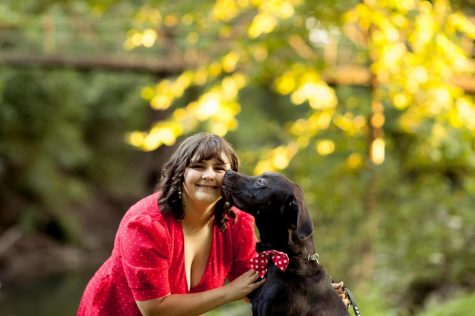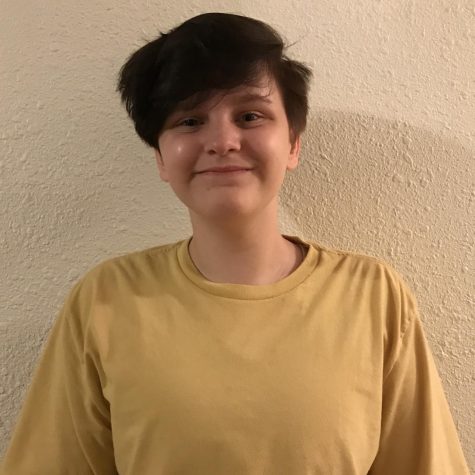Service Dog Aladdin Opens Whole New World For Cancer Survivor Winter Racine
December 3, 2019
High school is hard enough for healthy students. Now imagine being a cancer survivor with permanent nerve damage, fatigue, migraines, and panic attacks adjusting to going from being home schooled to attending a school as large as Belleville West.
That’s what cancer survivor Winter Racine lives with on a daily basis.
Winter’s grandmother Doris Riley recalls the emotions that she felt when Winter was diagnosed with Hodgkins Lymphoma.
“I was angry and very scared she would die,” Doris Riley said. “I just couldn’t believe it was true.”
Once the family found out, Winter started homeschooling.
“The biggest thing she lost was the ability to be in school and be involved in clubs and form friendships,” Winter’s mother Jeanette Riley said.
Although Winter is now in remission, meaning she has been cancer free for at least two years, she still battles the side effects from the chemotherapy she endured.
“Chemo is one of the hardest drugs that you can take and it’s a necessary evil. I have nerve damage in my hands and feet which make it hard to walk or stand for longer periods of time. I also have short term memory loss which makes it incredibly difficult to take tests and finals and SAT’s. I also have severe social anxiety and depression,” Racine said.
Helping combat some of the side effects and shortcomings as a result of the chemo is Winter’s service dog Aladdin.
“He does things called tasks which are things that mitigate a disability. So he’s specifically for a disability, not just emotional support,” Racine said.
And while many don’t understand the full scope of a service dog’s duties, simple requests not to pet Aladdin or not to take pictures with him can often be misinterpreted.

Cancer survivor Winter Racine with her service dog Aladdin.
“It’s really important for him to have complete and utter focus on me and only me because he could miss an alert or not be able to tell me about a migraine coming up or a panic attack if he is distracted. Although it doesn’t seem like taking a picture with him bothers him, I am a very anxious person. It makes me very uncomfortable. So I ask people not to take pictures with him because I hate it so much,” Racine said.
Because of his unique training, Aladdin is protected by the Americans With Disabilities Act.
“A lot of time and money and patience go into a service dog. It requires about two years of training before going into public,” Jeanette Riley said.
When not in service assisting Winter, Aladdin loves walks and dog parks.
“He loves to go to the dog park. He loves to play tug-of-war, and he loves to just go out and train. We go to some public stores and he works on his abilities,” Racine said.
At school, Winter enjoys writing and says English is her favorite subject.
“I love Mr. Garland. He has helped me so incredibly much. I have a hard time coming to school and keeping myself motivated. The fact that he is my first hour, and I’m going to see him in the morning, really helps me. It really impacts the way I feel about school and it goes to show how great teachers can do great things,” Racine said.
While Winter is a member of Key Club its focus on volunteering and giving back to the community, her sights are set on the future.
“I’m putting most of my energy into preparing myself into what it would be like to be a vet tech. I really love animals. They’re my biggest passion,” Racine said.
As for her hobbies, Winter is all about giving back to the community she feels has given her so much.
“Overall, I think it’s important to know that I’m no longer angry that I had cancer. Cancer helped me grow as an individual, it gave me a new outlook on life and made me into a better person. I’m definitely more grateful as a human, for my life and the people in it, because of cancer. A lot of valuable life lessons came from what I went through. I’m grateful to be alive, and now my biggest focus is raising awareness for children affected by cancer. Childhood cancer only receives about 4% of all cancer funding, which is extremely low. We need to do more to help the children of our future fight this evil creature. So many children are diagnosed daily, and so many children die the same. We’re even now facing worldwide shortages on life saving chemotherapy. It’s so important that we as a society learn more about childhood cancer, and do more,” Racine said.


Justin sterling • Dec 14, 2019 at 5:21 pm
Beautiful article wrote for a beautiful person! You are such an inspiration for so many and I am proud to call u my friend. Life has so much in store for you and the lives you will make a difference in. I’m so glad your circumstances didnt sour u in life. Dont forgrt u can hit me up anytime u need to talk or a friend.
Diana Reed • Dec 13, 2019 at 8:54 pm
That was a beautiful story.. well written indeed . Winter is my niece and I am very grateful she is still with us. And might I add that most the training she did herself..very determine and devoted…. She is a very beautiful person….